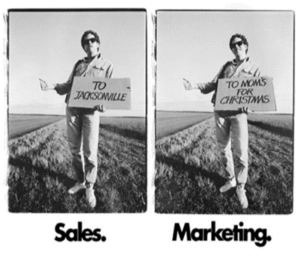General Business Strategy
Sales and Marketing, or Sales vs Marketing?
If sales and marketing were cities, they’d be Sydney and Melbourne. Both of them lively, wonderful places but very different in every way, except for their shared disregard for each other’s charms, and their common goal of being a great place to live.
You see where I’m going here ;)
The aim of both sales and marketing is to sell, of course – they just go about it in different ways. A tongue-in-cheek example:

There isn’t a business anywhere that can’t be improved by combining them effectively, and when they work together the results are incredible.
Get it wrong and you’ll see tensions within your team and lost opportunities.

But first a question you might be asking yourself:
Sales built our business, why would we need marketing?
There are two reasons: scalability. And market expectations.
1. Sales can’t scale
Sales is primarily about responding to a customer’s specific situation (whether they need information and adv ice about features, product-fit, implementation, cost-modelling, similar case studies etc), overcoming resistance and then negotiating and closing the deal. It involves direct interaction with each individual customer, addressing their concerns, and persuading them to make a purchase.
This is expensive, resource-intensive and there’s a limit to the number of people any salesperson can reach and engage with. It’s frequently the cause of growth stalling – sales is simply not scalable.
The only factor limiting marketing’s scalability is budget; more money means it reaches more prospects and automation means it can capture and process an unlimited number of leads.
2. The market wants your information way before they engage with you
Traditionally marketing has been about crafting and spreading a story that gets attention and generates interest and a desire to know more (and/or to buy).
This is still true, but today, it’s also increasingly about providing sales information.
It needs to do this because the line between sales & marketing has changed thanks to the internet.

Prospects used to see an ad, and then pick up the phone or enter a store, and sales took over from there. Now, they research online first and much of the decisioning is done before they ever make contact. This is especially true in the B2B area.
-
- 90% of B2B buyers turn to online channels as their primary method for identifying new suppliers.
- 90% of B2B buyers research 2-7 websites before making a purchase.
- B2B buyers engage with 3-7 pieces of content before talking to a sales rep, and 11% said they consume over 7 pieces of content.
(Source: Kurve.co.uk)
Marketing is now doing part of the sales job – educating and qualifying. What prospects see online – your website, content and so on – can mean you never hear from them, or they come to you positively predisposed, depending on how effective your marketing has been.
Get this right and your salespeople will get more leads and close more deals, faster – returning a better ROI on your sales overhead.
The CEO view: is Sales-led or Marketing-led best for growth?
In a sales-led business
the product or service is sold.
This is where you’re not about volume sales, the value of each sale is much higher, and it’s probably a complex solution that needs a lot of explanation, or even tailoring to the end user.
Sales leads because a face-to-face conversation is normally required to discuss the customer’s problems and needs, the relevant features and benefits of your solution, then hopefully overcome resistance and make the sale.
Marketing in this instance is secondary; it helps in the run-up to the sales discussion (more on that below) and supports the salesperson with the preparation of information, but it’s ultimately sales’ role to get the signature on the bottom line.
In a marketing-led business
the product or service is bought.
In this kind of business you’ll generally have a higher sales volume, and the purchase is more transactional in nature. Staplers, software, simple services, consumables for example. The role of marketing is to create awareness, appeal and connection, communicate value and facilitate the sale.
There might well be parallels here with your distribution model; whether you sell direct or via a third party. It’s marketing that helps Nikes fly off the shelf, but it’s sales that makes sure they’re stocked in the first place.
Example: getting sales & marketing together at IBM
IBM hadn’t co-ordinated sales and marketing and it was hurting their results.
Sales were only concerned about fulfilling product demand, but not creating it. Marketing, couldn’t get the sales data that would have allowed them to identify and optimise the activities that generated the most leads, so the sales team had little regard for their efforts. New product announcements were made before sales were ready to support them, and the whole operation was working at cross purposes.
Eventually, the decision was made to integrate the two departments into a new function called Channel Enablement, and the result..?
Sales cycles got shorter, market entry costs were reduced, and the cost of sales overall was lower. (Source: Harvard Business Review)
Now, we’re not saying that’s the right solution for everybody at all, but let’s look at some ways marketing and sales can co-ordinate to increase your leads and customer conversions.
How do you get effective marketing going in a sales-led organisation?
Even if you’re selling a highly complex $10m product to just a few individuals each year, marketing still has a crucial role to play.
First, defining the strategic fundamentals that are the starting point in all the business’ communications; brand strengths and values, customer value promise, points of differentiation, positioning vs the competition, even tone of voice should all be aligned and consistently delivered across both sales AND marketing.
That’s why, at InsideOut Group we facilitate collaborative strategic development with both sales and marketing.
Once the strategy is agreed, it’s then marketing that translates it into action – the brand, the website, the tactical messaging and so on.
There’s a variety of things this can entail, but here are a few examples, depending on the situation:
| BUSINESS SITUATION | EXAMPLES OF MARKETING SUPPORT |
| Highly complex product | Provision of clear, easy to consume information that’s well presented and brand appropriate. Organising and promoting webinars and other educational events. |
| Long lead times/time to close | Nurture campaigns – automated email program builds layers of value over time while prospect in in consideration mode |
| Low repurchase frequency | Nurture campaigns – automated email program reminds customer when they should be considering another purchase and re-iterates value offered and provides any product updates |
| High repurchase frequency/subscription model | Maintenance campaigns – automated email program maintains awareness and presents the brand in engaging new ways to maintain preference |
| Most B to B scenarios | Customer journey planning identifies the best way to reach, inform and influence a prospect at every step as they progress towards a sale |
Bottom line: play nicely to win the game!
Those are just a few steps you can take to get marketing working well with a sales-led organisation.
And if you get it right, you’ll supercharge your sales function, providing then with highly qualified leads on a more consistent basis. All from getting sales to work with marketing, and not sales vs marketing.
You’re probably realising that it’ll take a skills and experience to drive all this, and if you can afford it, you’ll want to hire a Senior Marketer.
If not, we can help with our unique approach that’s been refined working on dozens of resource-restrained businesses. If you think there might be something in that, we’ll be happy to sketch it out for you.
If you go your own way, we wish you the best in taking the next step in the growth of your business – this one’s a big one!
> More details here on our Part Time Senior Marketer service.




